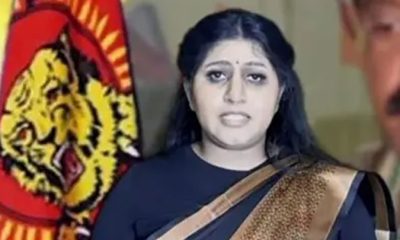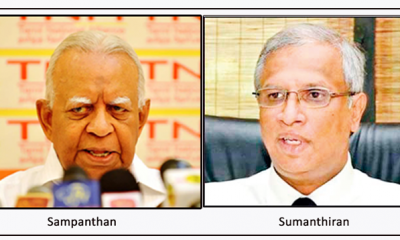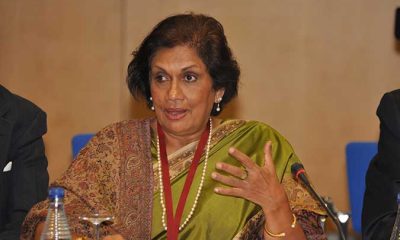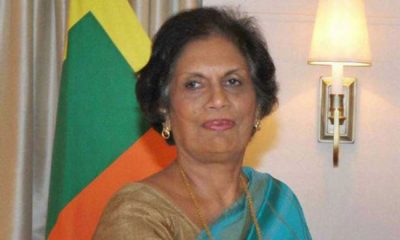News
Implementation of Yahapalana strategy President’s real intention – Manohara
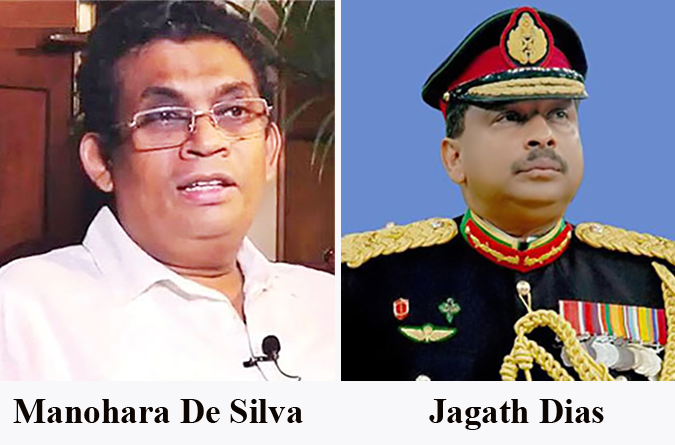
Lt. Gen. Dias warns of Eelam through constitutional means
By Shamindra Ferdinando
Former Army Chief of Staff Lt. Gen. Jagath Dias asks whether a plan is underway to help establish Eelam by constitutional means.The Gajaba Regiment veteran asked a gathering at Sri Sambuddhathva Jayanthi Mandiraya whether they realised that the full implementation of the 13th Amendment to the Constitution would pave the way for a separate state in the Northern and Eastern province for all practical purposes.
The former frontline combat veteran said so, addressing a recent meeting to educate the people on the danger of the full implementation of the 13th Amendment to the Constitution, enacted in the late 1988 in terms of the Indo-Lanka Accord signed in the previous year virtually at the point of a gun held by New Delhi.
Having served the Army for over 35 years, Jagath Dias retired in Dec. 2015. At the time of his retirement, he held the rank of Major General. The ex-soldier said that he felt the urgent need to oppose the Wickremesinghe-Rajapaksa government move as it would lead to the disintegration of the country.
Those who had fought the LTTE, at the risk of their lives to bring the war to a successful conclusion in May 2009, were aghast at the current moves to facilitate the separatist agenda, the wartime General Officer Commanding (GoC) of the 57 Division said. The first Division, deployed on the Vanni front in March 2007, as the LTTE abandoned its bases in the East, the formation was tasked with regaining Kilinochchi.
The former GoC queried whether withdrawal of some military bases, at the expense of national security, giving up control of archeological sites, privatization of public assets and weakening of the military, were meant to create an environment, conducive for the breaking up of the country.
Lt. Gen. Dias who had never addressed such a public gathering before said that the implementation of the 13th Amendment couldn’t be justified, under any circumstances, as India failed to execute her side of the Accord that was forced on Sri Lanka.
Recalling the direct Indian military intervention, in 1987, as troops engaged in first brigade-level offensive in the Vadamaratchchi region of the Jaffna peninsula were on the verge of capturing Vellupillai Prabhakaran, the retired officer recalled stressing that the LTTE couldn’t be disarmed in terms of the Agreement. Therefore, Sri Lanka was not obliged to honour the accord, the Gajaba veteran said, urging fresh appraisal of the country’s response to the emerging threat.
India completed the withdrawal of its troops in March 1990. Referring to the May 1991 assassination of Congress I prime ministerial candidate Rajiv Gandhi contesting the general election, Lt. Gen. Dias explained how in the absence of proper defence and foreign policies, the LTTE gradually developed into a formidable conventional fighting force, inclusive of a deadly suicide wing that claimed the lives of so many innocents. The ex-combat officer compared the growth of the LTTE with the corresponding failure on the part of successive governments to realize the impending danger and counter the threat.
Sri Lanka should keep in mind that India forced the controversial constitutional amendment after having threatened the then executive, Lt. Gen. Dias said.At the onset of his speech, the ex-solder emphasized that he didn’t represent any political party or particular ideology. “I was influenced by the unexpected political changes last year and subsequent developments,” Lt. Gen. Dias said, declaring that the division of the country wouldn’t be allowed.
President’s Counsel Manohora de Silva, who had been always at the forefront of campaigns against separatist agenda, warned that President Ranil Wickremesinghe’s real intention was to implement constitutional proposals that were submitted by a parliamentary committee during the Yahapalana administration during which he served as the Prime Minister.
The constitutional expert said that President Wickremesinghe had been quite clear about his intention when he addressed the Parliament on 09 Aug., regarding the course of action he intended to take with regard to the issue at hand.
Referring to the constitutional proposals formulated by a parliamentary committee that included Presidents Counsel M.A. Sumanthiran (TNA) and Jayampathy Wickremaratne (UNP National List), Manohara de Silva PC said that the overall project was meant to strip Sri Lanka of its unitary status.
Pointing out that the Chief Government Whip Prasanna Ranatunga declared their support for 13A plus, immediately after President Wickremesinghe’s 09 Aug. speech, Manohara de Silva said that the UNP leader and the SLPP leader Mahinda Rajapaksa seemed to be on the same page.
Recently, rebel SLPP MP Prof. Channa Jayasumana asked former President Gotabaya Rajapaksa to state his position on President Wickremesinghe’s plan as the latter was elected in July last year to complete the five-year term won overwhelmingly by the former President at the Nov. 2019 presidential election. Prof. Jayasumana said that the former President could not keep quiet when his mandate was used contrary to the wishes of the electorate that elected him.
The President’s Counsel said that all previous presidents, including Chandrika Bandaranaike Kumaratunga, who believed in devolution, refrained from implementing certain provisions in the 13th Amendment as they realized the danger.
Referring to the relevant sections in the 13th Amendment, Manohara de Silva explained how the full implementation could quickly lead to chaos. The lawyer discussed the circumstances under which the Northern and Eastern provinces could amalgamate again to consolidate the Tamil homeland theory.
Reminding how Dinesh Gunawardena voted against the 13th Amendment in 1988 when it was presented at the behest of India, Manohara said he was utterly disappointed at the way the MEP leader remained silent when President Wickremesinghe advanced his political agenda. The lawyer stressed the responsibility on the part of Cabinet ministers to state their position on the 13th Amendment or be prepared to face the consequences.
The President’s Counsel explained how the full implementation of the 13th Amendment could reduce the national police to the task of providing protection to ‘VIPs’ whereas provincial police, under the Chief Ministers, take charge of law and order.
The outspoken lawyer urged the PM and other parliamentarians to ascertain the rapid developments taking place and take decisions with national interest in their hearts.
News
US sports envoys to Lanka to champion youth development

The U.S. Embassy in Colombo welcomed the U.S. Sports Envoys to Sri Lanka, former National Basketball Association (NBA) and Women’s National Basketball Association (WNBA) players Stephen Howard and Astou Ndiaye, from June 8 through 14.
The Public Diplomacy section of the U.S. Embassy said that it would launch a weeklong basketball program intended to harness the unifying power of sports, made possible through collaboration with Foundation of Goodness and IImpact Hoop Lab.
While in Sri Lanka, Howard and Ndiaye, both retired professional basketball players, will conduct a weeklong program, Hoops for Hope: Bridging Borders through Basketball. The Sports Envoys will lead basketball clinics and exhibition matches and engage in leadership sessions in Colombo and Southern Province for youth aged 14-18 from Northern, Uva, Eastern and Western Provinces, offering skills and leadership training both on and off the court. The U.S. Envoys will also share their expertise with the Sri Lanka Basketball Federation, national coaches, and players, furthering the development of basketball in the country. Beyond the clinics, they will collaborate with Sri Lankan schoolchildren to take part in a community service project in the Colombo area.
“We are so proud to welcome Stephen and Astou as our Sports Envoys to Sri Lanka, to build on the strong people-to-people connections between the United States and Sri Lanka,” said U.S. Ambassador Julie Chung. “The lessons that will be shared by our Sports Envoys – communication, teamwork, resilience, inclusion, and conflict resolution – are essential for leadership development, community building, equality, and peace. The U.S. Sports Envoy program is a testament to our belief that sports can be a powerful tool in promoting peace and unity.”
News
Rahuman questions sudden cancellation of leave of CEB employees

SJB Colombo District MP Mujibur Rahuman in parliament demanded to know from the government the reasons for CEB suspending the leave of all its employees until further notice from Thursday.
MP Rahuman said that the CEB has got an acting General Manager anew and the latter yesterday morning issued a circular suspending leave of all CEB employees with immediate effect until further notice.
“We demand that Minister Kanchana Wijesekera should explain this to the House. This circular was issued while this debate on the new Electricity Amendment Bill was pending. There are many who oppose this Bill. The Minister must tell parliament the reason for the urge to cancel the leave of CEB employees,” the MP said.However, Speaker Mahinda Yapa Abeywardena prevented Minister Wijesekera responding to the query and said that the matter raised by MP Rahuman was not relevant.
News
CIPM successfully concludes 8th Annual Symposium

The Chartered Institute of Personnel Management (CIPM) successfully concluded the 8th Annual CIPM Symposium, which took place on 31st May 2024. Themed “Nurturing the Human Element—Redefining HRM in a Rapidly Changing World,” the symposium underscored the pivotal role of human resource management (HRM) in today’s dynamic global landscape. Since its inception in 1959, CIPM has been dedicated to advancing the HR profession through education, professional development, and advocacy, solidifying its position as Sri Lanka’s leading professional body for HRM.
Ken Vijayakumar, the President of the CIPM, graced the occasion as the chief guest. The symposium commenced with the welcome address by the Chairperson, Prof. Arosha Adikaram, followed by the Web Launch of the Symposium Proceedings and Abstract Book by the CIPM President. The event featured distinguished addresses, including a speech by Chief Guest Ken Vijayakumar, President of CIPM, and an address by Guest of Honor Shakthi Ranatunga, Chief Operating Officer of MAS Holdings Pvt. Ltd., Sri Lanka.
The symposium also featured an inspiring keynote address by Prof. Mario Fernando, Professor of Management and Director of the Centre for Cross Cultural Management (CCCM) at the University of Wollongong, Australia.
Vote of Thanks of the inauguration session was delivered by Dr. Dillanjani Weeratunga, Symposium Co-chair.
The symposium served as a comprehensive platform for researchers to present their findings across a wide range of critical topics in HRM. These included Cultural Diversity and Inclusion, Talent Development and Retention, Ethical Leadership and Corporate Social Responsibility, Adapting to Technological Advancements, Mental Health and Well-being at Work, Global Workforce Challenges, Employee Empowerment, and Reskilling and Upskilling.
The plenary session was led by Prof. Wasantha Rajapakse. Certificates were awarded to the best paper presenters during the valedictory session, followed by a vote of thanks delivered by Kamani Perera, Manager of Research and Development.
The annual symposium of CIPM was a truly inclusive event, attracting a diverse audience that spanned undergraduates, graduates, working professionals, research scholars and lecturers. This widespread interest highlights the symposium’s significance in the field of HRM, offering a unique opportunity for everyone to network and learn from scholarly brains.The CIPM International Research Symposium was sponsored by Hambantota International Port, Sri Lanka Institute of Information Technology (SLIIT), E B Creasy & Co. PLC, and Print Xcel Company.


